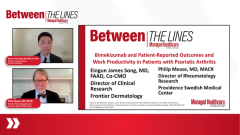
Important Takeaways for Patients, Providers and Payers
Panelists discuss how bimekizumab represents a valuable addition to the psoriatic arthritis treatment armamentarium, given its novel dual mechanism, ability to address multiple disease domains and potential to benefit patients who have lost response to other biologics, reducing healthcare burden and improving societal economic outcomes.
Episodes in this series

Despite significant therapeutic advances in psoriatic arthritis treatment, substantial unmet medical needs persist, with many patients failing to achieve treatment goals even with current options. Bimekizumab addresses this gap by providing a new medication and a novel mechanism of action through comprehensive IL-17A and IL-17F inhibition, distinguishing it from existing IL-17A-only inhibitors. The phenomenon of gradual or sudden efficacy loss affects virtually all psoriatic arthritis medications over time, necessitating additional therapeutic options with distinct mechanisms to maintain optimal disease control and address critical outcomes, including pain, fatigue, work productivity and physical function.
The comprehensive clinical trial data demonstrate bimekizumab’s effectiveness in achieving low disease activity or remission while providing meaningful improvements across multiple patient-reported outcome measures. This represents a welcome addition to the therapeutic armamentarium, offering clinicians and patients another effective tool for managing this complex multidomain disease. Patient feedback has been overwhelmingly positive, with many expressing heartfelt gratitude for minimized disease activity and improved long-term prospects for structural damage prevention, enhanced work capacity and improved family life quality with reduced pain and fatigue burden.
The broader healthcare implications extend to multiple stakeholders, with patients benefiting from reduced suffering and improved function, clinicians gaining additional tools to address patient needs meaningfully and payers potentially realizing economic benefits through improved societal productivity and reduced healthcare burden. Untreated or inadequately treated patients with psoriatic arthritis represent substantial healthcare network burdens, making investment in effective treatments economically justified through improved disease activity control. The data support the value proposition that paying for advanced biologic therapies yields beneficial returns through enhanced patient outcomes, reduced healthcare utilization, and improved societal economic contribution, creating a compelling case for treatment access and coverage decisions.
Newsletter
Get the latest industry news, event updates, and more from Managed healthcare Executive.
























